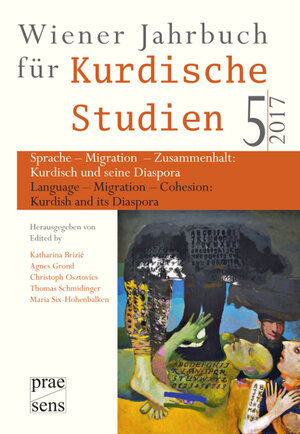
×
![Buchcover ISBN 9783706909655]()
Sprache – Migration – Zusammenhalt: Kurdisch und seine Diaspora | Language – Migration – Cohesion: Kurdish and its Diaspora
herausgegeben von Katharina Brizić, Agnes Grond, Christoph Osztovics, Thomas Schmidinger und Maria Six-HohenbalkenThe fifth volume of the Vienna Yearbook for Kurdish Studies reaches out to everyone interested in language, migration, and social cohesion. It is intended for students and advanced scientists, for researchers and practitioners likewise, and addresses a wide range of disciplines, such as linguistics and sociolinguistics, sociology and political science, social and cultural anthropology, migration, memory and genocide studies, and many more. Why is this so? The reason lies in the topic itself: this is a book about Kurdish. There are only very few topics, we believe, that attract so many disciplines and refer to so many realms of human experience in just one breath of air. Kurdish does.
Kurdish does so already on the linguistic micro level — i. e., as a language ‘entity’. In the twinkling of an eye, the issue of Kurdish languages leads to fundamental discussions on the nature of language, language boundaries and linguistic relationships, and further to identity, social cohesion, collective memory, and its significance for any definition of ‘language’. Only rarely are the different aspects so obviously and inescapably intertwined as in the case of Kurdish. Kurdish is thus an excellent starting point for understanding why language can never ever be analysed separately from human experience, memory, politics, social development, and social cohesion (not just) in our late modern times. Kurdish is an impressive testimony for the deep human attachment to language — since it is all but self-evident that both in oral communication and writing Kurdish has been maintained so vibrantly until today.
Kurdish does so already on the linguistic micro level — i. e., as a language ‘entity’. In the twinkling of an eye, the issue of Kurdish languages leads to fundamental discussions on the nature of language, language boundaries and linguistic relationships, and further to identity, social cohesion, collective memory, and its significance for any definition of ‘language’. Only rarely are the different aspects so obviously and inescapably intertwined as in the case of Kurdish. Kurdish is thus an excellent starting point for understanding why language can never ever be analysed separately from human experience, memory, politics, social development, and social cohesion (not just) in our late modern times. Kurdish is an impressive testimony for the deep human attachment to language — since it is all but self-evident that both in oral communication and writing Kurdish has been maintained so vibrantly until today.


